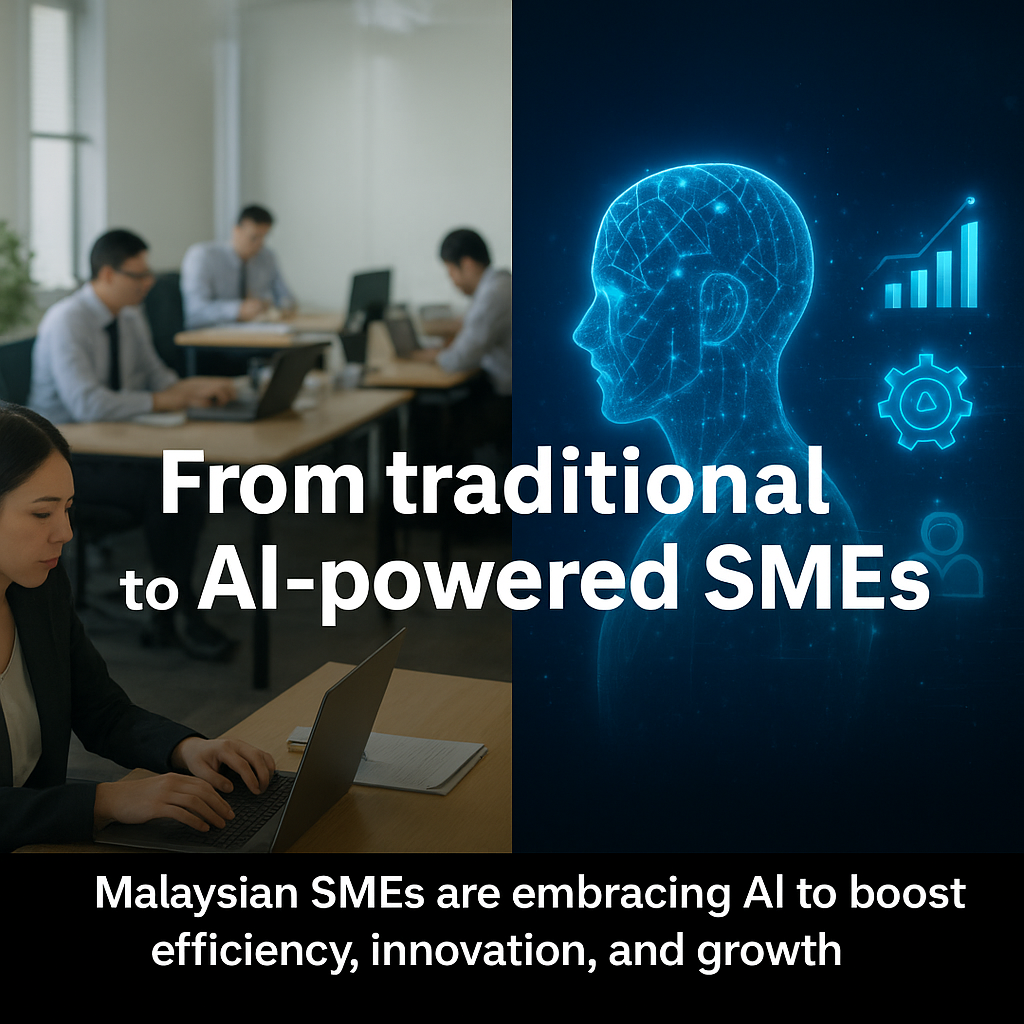Small and medium enterprises are often described as the backbone of Malaysia’s economy. They make up more than 97 per cent of all registered businesses and employ millions of Malaysians. They sustain family livelihoods, fuel innovation, and provide the flexibility that large corporations often lack. But in an increasingly digital economy, traditional methods of doing business no longer guarantee survival.
A recent study led by Dr Muhammad Farhan Jalil from Universiti Malaysia Sarawak, published in AI & Society, provides compelling evidence that artificial intelligence (AI) is not simply a futuristic buzzword. It is already redefining how Malaysian SMEs operate, compete, and create value.
This research arrives at a pivotal moment. Malaysia has been accelerating its National Digital Economy Blueprint (MyDIGITAL), aiming to position itself as a regional digital hub by 2030. AI adoption among SMEs sits at the intersection of this national ambition and the urgent need for businesses to modernise.
Why AI is no longer optional for small businesses
Artificial intelligence is no longer confined to science fiction or Silicon Valley laboratories. It now powers everyday tools that shape business decisions. Chatbots respond instantly to customer queries. Algorithms predict stock levels and market demand. Recommendation systems personalise services for individual clients.
For Malaysian SMEs, which typically struggle with limited manpower and budget constraints, AI represents a practical way to compete with larger corporations. Instead of hiring extra staff, an SME can deploy an AI-powered tool that automates repetitive tasks, analyses data with greater precision, and provides real-time insights. This reduces human error, cuts costs, and frees employees to focus on creative or customer-facing tasks.
The study by Dr Jalil and colleagues shows that SMEs adopting AI are not just surviving in the digital era. They are unlocking new forms of digital value creation, expanding their reach, and delivering more personalised experiences to customers.
What digital value creation really means
The concept of digital value creation (DVC) may sound abstract, but in essence it describes how businesses generate additional value by integrating digital tools into their operations.
For SMEs, this could involve automating invoice processing to save time, using predictive analytics to anticipate customer demand, or entering new markets via digital platforms. It could also mean building unique competitive advantages that make their services difficult to replicate.
The research found that SMEs adopting AI were significantly more capable of digital value creation. More importantly, the impact of AI was magnified when firms had a strong technological orientation. In other words, AI alone is not enough. The mindset of the business also matters.
Technological orientation
One of the most powerful insights from the study lies in the mediating role of technological orientation. Simply purchasing AI tools does not guarantee success.
Technological orientation refers to the willingness and capacity of a business to experiment with and embrace emerging technologies. It reflects a culture of innovation, investment in new tools, and the ability to adapt to evolving trends. Firms with high technological orientation are proactive rather than reactive. They look for new opportunities, train their employees, and remain alert to both market and technological shifts.
The study’s statistical analysis, based on structural equation modelling of responses from 335 SME owners and managers, showed that technological orientation strengthens the connection between AI adoption and digital value creation. It is the bridge that turns raw technology into sustainable business growth.
The design combined the adsorption properties of activated carbon with the catalytic efficiency of iron, providing a continuous treatment system more suited for industrial application. This research highlighted how laboratory innovation could be translated into industrial-scale processes, bridging the gap between bench-scale chemistry and practical engineering solutions.
Behind the research: Voices and numbers
The study surveyed 335 SMEs across Malaysia, with an impressive 87.2 per cent response rate. The majority were from the services sector (86.9 per cent), while 13 per cent represented manufacturing. Respondents were fairly evenly distributed in gender, with 63.9 per cent male and 36.1 per cent female, and most were between 31 and 50 years old.
This diversity provides a representative snapshot of how different SMEs perceive and use AI. One SME owner in the survey captured the sentiment succinctly: “AI helps us work smarter, not harder. It’s like having an extra team that never sleeps.”
Such testimonies underscore how AI is viewed less as a threat and more as an enabler, especially for businesses that struggle to scale without large capital investment.



Current hurdles on the road to adoption
While the promise of AI is strong, the study also acknowledged significant challenges.
Cost remains a major barrier. Many SME owners worry that implementing AI tools requires high upfront investments. This perception creates hesitation, even when long-term benefits may outweigh initial costs.
Skill shortages are another obstacle. SMEs often lack employees with the technical expertise to manage AI systems. Without proper training, tools risk being underused or misapplied.
Finally, uncertainty persists. Some SMEs are unsure how AI fits into their existing business models. The lack of clear case studies or sector-specific examples leaves owners wary of investing in systems that may not deliver measurable returns.
Why Malaysia’s economy depends on SME digitalisation
The stakes extend beyond individual businesses. SMEs account for nearly 40 per cent of Malaysia’s GDP, and their ability to innovate has direct consequences for national growth.
The World Bank has repeatedly stressed that digital transformation is critical for Malaysia’s competitiveness. By 2030, global markets will be dominated by data-driven industries. If Malaysian SMEs fail to adapt, the country risks lagging behind regional competitors like Singapore, Vietnam, and Indonesia, which are aggressively investing in digital infrastructure.
Adopting AI could therefore act as both a survival strategy for SMEs and a driver of national productivity. By streamlining operations, entering new markets, and creating innovative products, SMEs can strengthen Malaysia’s standing in the global digital economy.
AI and the global context
Malaysia is not alone in facing this challenge. Around the world, governments are encouraging SMEs to adopt AI as part of their broader digitalisation strategies. The European Union has invested in SME-focused AI accelerators. India has launched digital skilling initiatives for small businesses. Even African economies are exploring AI for agriculture and logistics.
In this global race, Malaysia must ensure its SMEs are not left behind. The country’s MyDIGITAL framework, launched in 2021, sets ambitious goals for digital adoption. But achieving these targets depends on translating policy into practice, ensuring SMEs can access affordable AI tools and receive the training necessary to use them effectively.
Implications for SME owners and policymakers
The research offers clear lessons. For SME owners, the message is that AI adoption is no longer optional. However, adoption should not be reckless. Businesses should begin with small-scale experiments, such as piloting a chatbot in customer service or using analytics in inventory management. Success in one area can then be scaled across operations.
Policymakers, meanwhile, need to support this transformation. Subsidies, training programmes, and public-private partnerships can lower entry barriers for SMEs. Collaborations with universities can also accelerate technology transfer, allowing businesses to experiment in safe environments before full-scale implementation.
AI is not just about replacing human labour. It is about augmenting human potential and creating new ways for SMEs to deliver value in the digital economy.
–Muhammad Farhan Jalil
Research and real-world evolution
The study was cross-sectional, capturing SME perspectives at a single moment in time. Future research could track adoption over several years to better understand long-term impacts. It could also focus on specific AI applications, from predictive analytics in retail to natural language processing in healthcare.
Despite these limitations, the findings are significant. They provide empirical evidence that AI adoption, combined with technological orientation, directly supports digital value creation. For Malaysian SMEs, this represents both an opportunity and a warning.
Reference
Jalil, M. F., Lynch, P., Marikan, D. A. B. A., & others. (2025). The influential role of artificial intelligence (AI) adoption in digital value creation for small and medium enterprises (SMEs): does technological orientation mediate this relationship? AI & Society, 40(5), 1875–1896. https://doi.org/10.1007/s00146-024-01969-1






